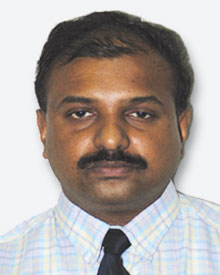 |
| Sri Lanka as a Knowledge Hub - the Opportunities and Challenges |
| |
 |
| |
| KSAM Graduates (graduates with proper Knowledge, Skills, Attitude and Mind set) |
|
One of the key achievements envisaged in “Mahinda Chinthana” is achieving the status of a Knowledge Hub for Sri Lanka by the year 2016. This is a huge challenge for a country with a primarily state funded higher education sector though we have witnessed some opening up of opportunities with the private sector funded fee levying courses. In this article, attention is mainly focused on the state sector universities that numbers 15 at the moment with full time courses and the Open University concentrating on “Distance Learning Mode”. One of the key needs of state universities of Sri Lanka would be to produce KSAM graduates (graduates with proper Knowledge, Skills, Attitude and Mind set) with high employability and communication skills in English. Most of the graduates falling into this category would be able to find gainful employment with high pay within three months of completion of final year examination.
|
|
|
...This change in the goal set for the state universities is a need to achieve the knowledge hub status. Thus, it has to be pursued with vigour in near future by the state universities irrespective of the ranking that each state university has gained so far. It should be stated that our state universities do not have noteworthy rankings at present. Even University of Moratuwa is ranked below 2000 when it comes to world rankings based on various criteria. Some state universities can be ranked below 5000. It is with this background that some opportunities and challenges are discussed.
|
| Download the full article |
|
|
The under employment is almost not existent with such graduates. The unemployment ratio is generally zero six months after the graduation. The important question is that how many of our various faculties in our universities produce such capable KSAM graduates. It would be necessary for all faculties in our state universities to produce such graduates if we are to realize the goal set as the “knowledge hub of Asia”.
|
| “World Class Graduates” (WCG) |
|
In this context, some of the faculties of our universities have performed remarkably well. For example, the three engineering faculties of our state universities, Moratuwa, Peradeniya and Ruhuna, have performed very well and even rank them as producing “World Class Graduates” though these state universities may have a long way to go to be ranked as “World Class Universities”. The reason is the exceptionally good lecturers available for teaching that has been instrumental in excelling in teaching though there will be a lot of room for developing the research culture and the associated publication practices to reach the coveted title of “World Class Universities”. Since there is ability to produce “World Class Graduates” (WCG), the students who pass out with the basic degree have been able to find employment in the international markets. This has on the one hand has resulted in brain drain with those who seek greener pastures. On the other hand, some of these graduates have found gainful employment in many other countries like middle east and Korea with exceptionally high salaries like US $ 5000 to 8000 per month. A lot of this money would finally end up in Sri Lanka thus further strengthening the balance of payment position in favour of Sri Lanka. Thus, the number of engineering graduates produced should not depend on the needs of the Sri Lankan industry, but shall depend on the ability of our engineering graduates to gain good employment with 6 -12 months of real industrial exposure after the graduation (if possible even finding employment abroad immediately after graduation). This is a situation that would ideally be expected from many other faculties of our state universities. The challenges that we have to face in elevating our state universities to such a state is explained in detail with some emphasis on the opportunities that we have to capitalize to reach the goal of “Knowledge Hub of Asia”.
|
| |
| The history |
|
For over 30 years, Sri Lanka country was involved in a protracted war since 1979. So, our university system did not receive much money for development (the capital grants and money for Research and Development). The academics, who stayed in Sri Lanka with tremendous courage and dedication did a remarkable job with the state sector university education (others left seeking greener pastures and it is difficult to blame them for doing so). However, the staff had to device our own strategies for survival since many of our faculties did not have new equipment, attractive research funding, good research students, etc.
The strategy that was generally devised at successful faculties was to develop our teaching to very high level. So, some universities like University of Moratuwa could promote the idea of "World Class Graduate" (WCG), the graduate who can fit the world at large and also can secure admission to the world's best universities effortlessly. However, this would be very different to a "World Class University" (WCU).
WCU is not easy to reach and we will need at least 10 more years where each faculty will need a capital grant of at least Rs 50- 75 million per year continuously for the next 5-6 years with at least Rs 50 -75 million per year allocated for R & D related expenditure (funding the stipend of Research Assistants, Teaching Assistants, traveling, purchasing of software, etc.).
|
| The ground situation |
|
After the end of the war in year 2009, GOSL got an opportunity to actively pursue the goals of Mahinda Chinthana. One of the key features of Mahinda Chinthana was a Knowledge Hub. So, many administrators at University Grants Commission and Ministry of Higher Education started promoting the "Ranking of a university". When this was floated first, many staff members were baffled since it was very different to producing quality employable graduates with well planned undergraduate courses. A highly ranked university will need a lot of post graduates undertaking cutting edge research where there is a good and competitive funding mechanism to sharpen the research and development work. Thus, the academics in our state universities saw a rapid change of the goals set for them. Previously, the main goal was producing “World Class Graduates” with the students sent to our state universities as undergraduates. Now, the new goal has been having a higher rank with our state universities which means concentrating on both the undergraduate programmes and post graduate research.
This change in the goal set for the state universities is a need to achieve the knowledge hub status. Thus, it has to be pursued with vigour in near future by the state universities irrespective of the ranking that each state university has gained so far. It should be stated that our state universities do not have noteworthy rankings at present. Even University of Moratuwa is ranked below 2000 when it comes to world rankings based on various criteria. Some state universities can be ranked below 5000. It is with this background that some opportunities and challenges are discussed.
|
| |
| Download the full article |
|
|
| About the Author |
 |
Prof. M.T.R. Jayasinghe
B.Sc. Eng (Moratuwa), Ph.D. (Cambridge), C.Eng., MIE(SL),MSSE(SL)
Senior Professor, Department of Civil Engineering,
University of Moratuwa |
| |
| Prof. M.T.R. Jayasinghe is a Senior Professor in Civil Engineering at the Department of Civil Engineering, University of Moratuwa. He also practices as a professionally qualified Chartered Structural Engineer specializing in high rise buildings and long span bridges. He is well recognized by the local construction industry as a good researcher and an innovative designer and has been instrumental in producing designs in collaboration with capable engineers in the industry like cost effective four lane Orugodawatta flyover and many structures in the Southern Highway Galle Matara extension, etc. |
| |
 |
|
2013 Membership Dues - Don't Delay Payments All membership fees are due on the 1st of the year (January 1, 2013).
|
|
Current IESL by Laws allow a grace period of unprecedented 11 months (Nov 30, 2013). Through the new Membership Management System, members who have not paid have been alerted via email and for this year only, reminder letters have been posted. When you login to the new system you will see the invoice and the methods to pay.
If not paid by Nov 30, 2013, the system will automatically remove the defaulters (on Dec 1, 2013) membership and electronic directories will not show their names. Losing membership means losing the Charter for the corporate members. All those who lose will have to go through a reinstatement process as per the by laws which is similar to obtaining a new membership under prevailing rules!!. Next year new laws will come into place to further tighten the process and grace periods. So please pay your dues and be considerate towards policies and ethics of the IESL. Contact Miss. Nimesha or Mr. N.P.P.K Costa at the IESL Membership Department on 011-2698426, ext 220 or e-mail your message.
|
|
|
| |
|
|
|
11-12-13th October 2013 at the BMICH
|
|
Techno Sri Lanka is the only exhibition, which features widest range of engineering and technology products and services. It has the only powerful cost effective component of a well-planned marketing strategy. It provides thousands of high quality sales promotion opportunities in just 3 days.
|
|
|
Stall bookings are
NOW ON...
Contact Malith Kannangara on
+94 77 777 1005
|
|
| |
|